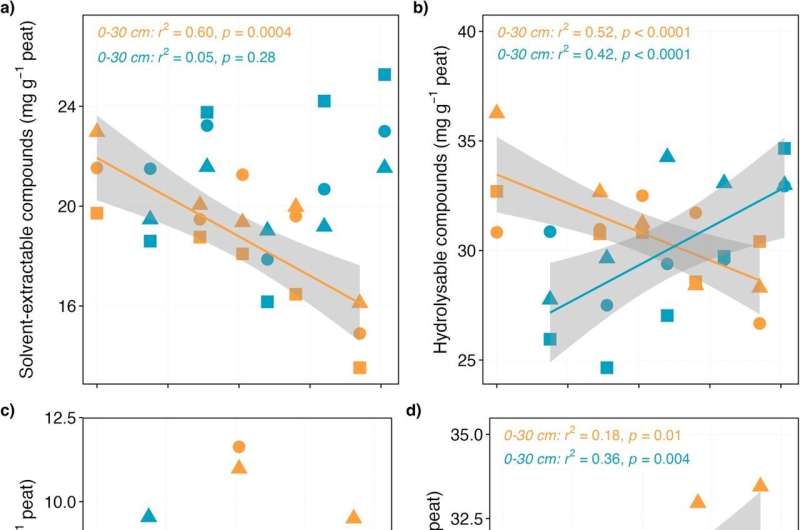This article has been reviewed according to Science X's editorial process and policies. Editors have highlighted the following attributes while ensuring the content's credibility:
fact-checked
peer-reviewed publication
trusted source
proofread
In peatland soil, a warmer climate and elevated carbon dioxide rapidly alter soil organic matter

Soils in northern freshwater wetlands, called peatlands, are cold, water-saturated, and acidic. These conditions slow microbes' decomposition of organic matter into greenhouse gases. This process stores carbon in the soil. Researchers use the Spruce and Peatland Responses Under Changing Environments (SPRUCE) experiment to warm air and soil in a northern Minnesota bog to simulate the effects of climate change on the carbon cycle.
In a new study, researchers have tested whether different components of the organic matter in soil would degrade at different rates in response to climate change. Surprisingly, the experiments showed that all organic soil components can break down more quickly in warmer conditions.
The work is published in the journal Nature Communications.
Peatlands store one-third of global soil carbon. While these ecosystems have sequestered carbon for millennia, climate change threatens to destabilize the "carbon bank" of peatland soils. These results demonstrate that the vast, deep carbon stores in peatlands are vulnerable to microbial decomposition that fuels greenhouse production in response to warming. The experiments also show that elevated carbon dioxide combined with warming could result in larger amounts of degradable substances produced by plants that in turn support microbes that produce greenhouse gases. This could compound climate change.
In the past, scientists suggested that complex components of plant-derived soil organic matter (SOM), such as lignins, may degrade faster than simpler SOM components with climate change. However, the current study rejected the hypothesis that complex SOM molecules are more responsive to temperature changes than less chemically complex carbon components of soil.
Instead, the researchers found that all molecular compounds comprising SOM, regardless of source and complexity, are vulnerable to shifts in climate drivers. Further, they observed increases in root-derived carbon compounds under elevated carbon dioxide conditions suggesting that warming and higher carbon dioxide levels may shift the peatland carbon budget towards pools with faster turnover.
Together, these results indicate that climate change may increase inputs of more reactive carbon compounds from plants and enhance the decomposition of SOM, a process known as "priming," potentially destabilizing carbon storage in peatlands.
More information: Nicholas O. E. Ofiti et al, Climate warming and elevated CO2 alter peatland soil carbon sources and stability, Nature Communications (2023). DOI: 10.1038/s41467-023-43410-z
Journal information: Nature Communications
Provided by US Department of Energy





















